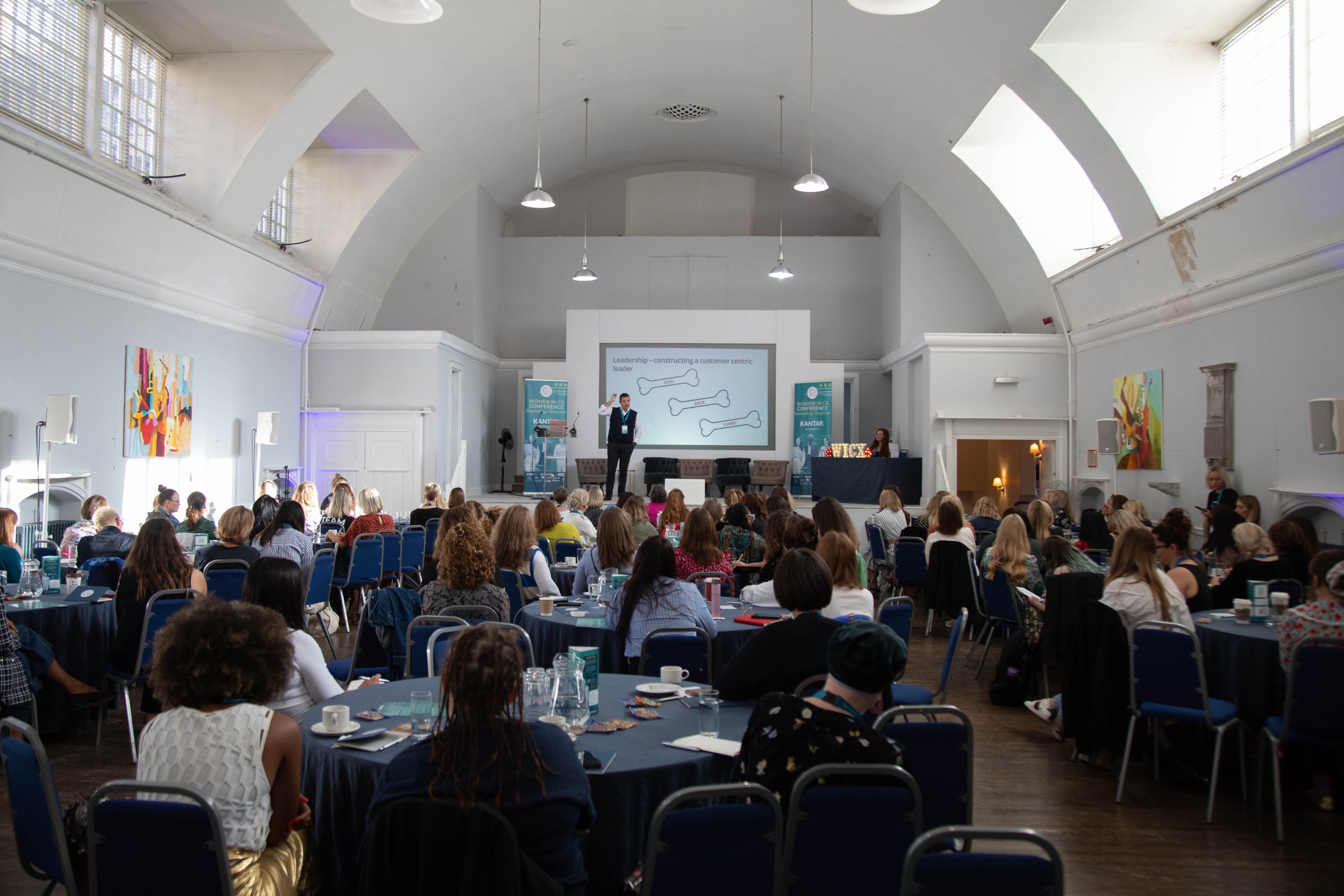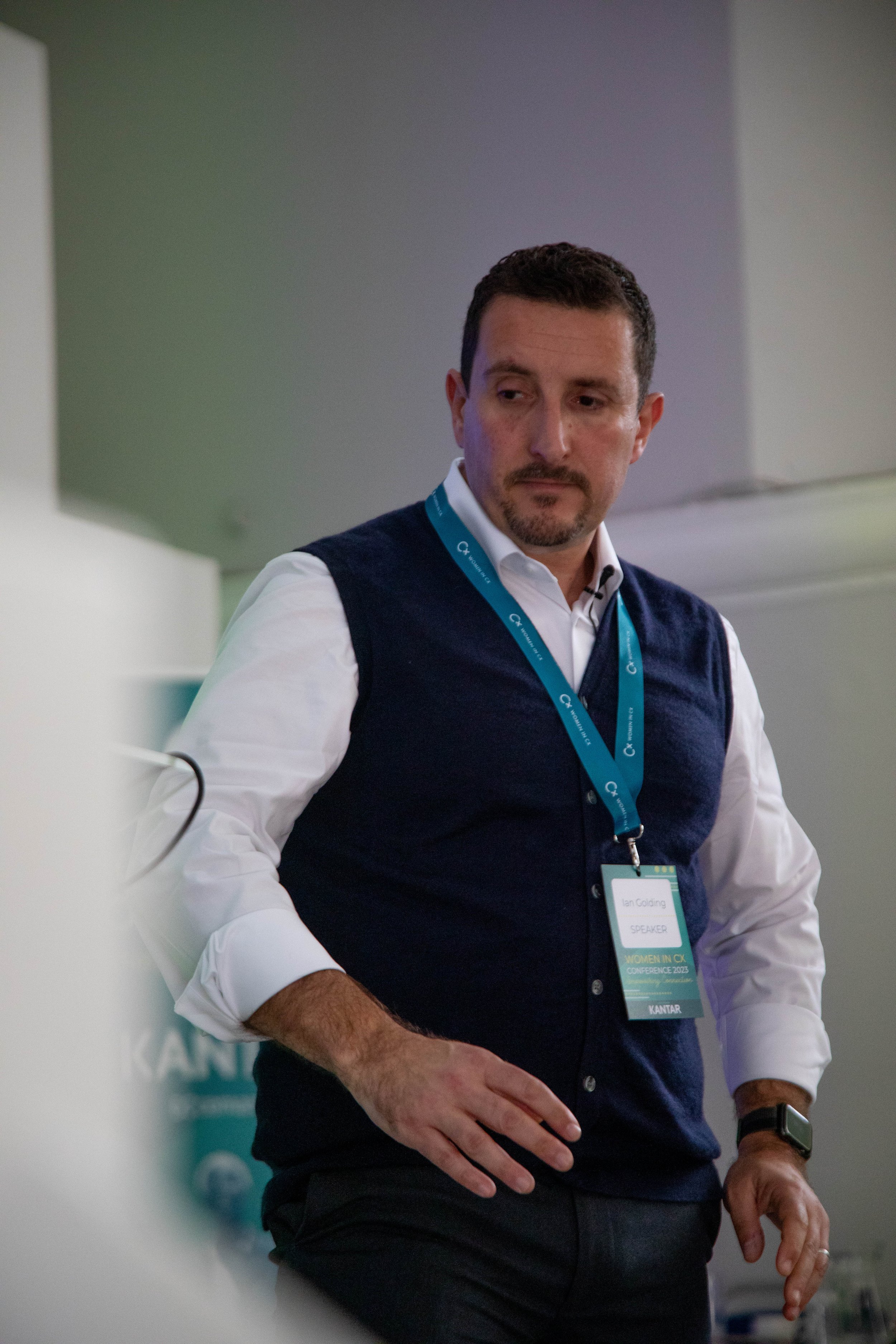The Brutal and Honest Truth About the Future of the CX Profession, with Ian Golding
Following our second annual Global Gathering Conference, over the next month we’ll be sharing key outputs from the keynotes, WiCX Talks, and discussions that took place, ensuring our vision for a human-centred future spans much further than just our community walls…
The rate of change in our world is increasing. With leaders under pressure to eliminate human beings from the process with automation and AI, CX is about to become more critical than ever, in the noble and historic fight to push the world of business back towards trust and connection.
This was very much the tone of Ian Golding’s presentation to the Women in CX 2023 Conference. The challenge we face is great — but the opportunity we have to make a truly positive impact is greater.
Without sugar-coating much of anything at all, Ian gave it to us straight about the future of the CX professional. And while there are a few sobering points to bear in mind — there’s also a lot to be excited about.
Ian Golding, Global Customer Experience Specialist and author of ‘Customer What?’, speaking at the Women in CX Global Gathering 2023.
So why is CX so critical in this world of inevitable change?
CX is the conscience of corporate
Customer experience has always been and will always be about human-to-human interaction. CX professionals are defined by their natural empathetic nature. We tend to do what we do because it’s the ‘right’ thing to do. Not because it’s the easiest way to cut costs and uplift KPIs.
We are perfectly placed to remind leaders that organisations exist to serve humans. Organisations don’t exist just to make money.
And one crucial message that we need to do better at driving home is that they will make more money if they serve humans better.
We need to do a better job of influencing shareholders
CX professionals across the board need to better communicate the value of what we do to people responsible for the markets. We’ve got to become storytellers and bring them along with a vision they can get excited about.
We’ve got to be political. CX is a long game — but we can entice shareholders to support our investments if we show them what we can offer in the short term.
In the short term, we can focus on cost savings — as well as, of course, a focus on customer centricity. We can offer cost reduction and the elimination of unnecessary activity as a tasty short-term benefit, while we get on with the larger work of transforming customer experiences for the long haul.
One thing that’s a win for everybody is eliminating things going wrong in the CX journey right now. Every customer pain point costs you money — this is something we could be hammering home more effectively for shareholders and decision-makers.
We live in a world that is far too obsessed with making money
Imposter syndrome quite easily sets in for CX professionals. We’re often the people in the room advocating for a humane future, whereas the focus for everyone else might be profit at all costs.
The obsession with making money is a huge problem for our plans, as well as the world. But ultimately, we need to meet leaders where they’re at and show them how CX transformations will protect and increase their profits into the future.
By being more political and strategic with our message, we’ll be able to effect greater change. We have to find the courage to fight against this ultra-capitalist drive of making money above anything else.
“Doing the right thing isn’t always easy, but doing the right thing is always right” — David Cottrell
There are no better people than the women in this room to push organisations to do the right thing. But how can we influence leadership towards customer-centric ways of thinking?
We need a wishbone, a backbone, and a funny bone. The wishbone is the desire and the ambition. The backbone is our determination and our grit. And the funny bone is going to be required to bring the humanity back into what we do.
Going to work isn’t fun anymore. We need to bring the fun in — and it could be our secret weapon of connection to get teams back in touch with their own humanity again.
From profit to purpose: why do organisations exist in the first place?
We are held back by many trends at play in the world of business. But there’s also some hopeful new ideas taking root.
Hierarchies to networks
We need to end the culture of military orders and internal competition between departments. It’s time we learned how to work cross-functionally and collaborate.
Controlling to empowering
We have to give our people control. Exceptional CX comes from empowering employees to think for themselves, with the freedom to use their common sense and go off script when necessary.
Planning to experimentation
The best CX comes from an attitude of experimentation. We need to stay committed to continuing education, and construct plans that have space for testing and trying out new ideas.
Privacy to transparency
Many organisations don’t actually know what’s going on in their customer journeys. By being more transparent, we’ll have greater awareness about the experiences our customers are having and know how to fix them.
Advocating for CX with sensitivity and empathy
Many leaders do understand the need for better CX, but they don’t have enough courage to stand for it. So how can we help them?
We need to do a better job of empathising with them.
If we’re going to sustain our ability as a profession to get people to adopt a customer-centric approach — we need to give people time to think.
They’re just trying to survive in the job like any other corporate employee. They’re just trying to position themselves for the promotion. How can we help them understand the wider benefits?
We have to stretch ourselves to move beyond empathy and into the realm of compassion.
Don’t be afraid to be as compassionate as possible. Be a leader in your organisation. Teach them how to listen, and how to understand. We have got to educate them to understand why bringing a human focus back into business is important — so we need to walk our talk and display our own humanity.
Although sometimes, we may need to use our initiative and courage — and ask for forgiveness rather than permission, if it’s the right thing for the organisation.
We need to radically simplify what we do
Ian asks CEOs 2 questions.
1. Do you think CX is important?
(... “yes”’)
2. And what proportion of your time have you spent focusing on it?
To many, CX is a leap of faith. Big consulting firms want leaders to think it’s really complicated — but it’s not.
Let’s get ourselves out of the theory, and into the operations. Just tell leaders what they need to do and keep it simple. Give it to them in bite-sized chunks. Go at a pace your organisation can handle.
Be the leader who shows them what they need and guides them along an epic journey towards a beautiful destination.
Conclusion
As a prolific supporter and partner of Women in CX, Ian made his belief in women’s capacity to shape the future of CX abundantly clear. Not just in this keynote — but in his enthusiasm for WiCX, our members, our impact and everything we represent.
From connecting with Clare when she started out as a consultant and supporting her growth, to becoming a key member of the WiCX Association — Ian made it clear that he was honoured to be with us, to work with us, and to support our efforts to guide the world of business towards a more human-centric future.
Are you ready to make real change happen for your customers, employees, and business, join the waitlist today. To learn more about membership and sign up now, just click here.
About Ian
Ian is a Certified Customer Experience Professional and Global Customer Experience Specialist. A certified Lean Six Sigma Master Black Belt, Ian has spent over twenty-five years in business improvement.
To date, Ian has supported organisations and professionals in 59 countries to better understand how to 'operationalise' the science of CX. As well as being the Course Director of CX for the Chartered Institute of Marketing, Ian was the first person in the world authorised to support professionals in achieving their CCXP accreditation.
A renowned keynote speaker and awards host, Ian's book, 'Customer What?', is widely respected by professionals globally.



